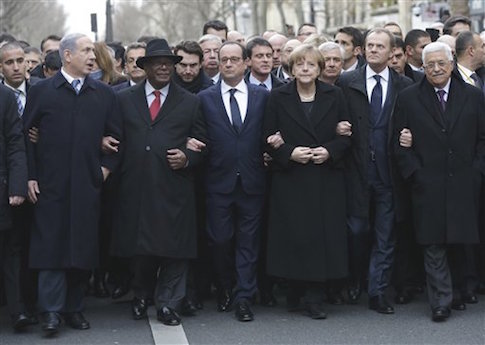JERUSALEM—French President Francois Hollande did not want Israeli Prime Minister Benjamin Netanyahu to come to Paris Sunday to participate in the march against terror so as not to divert attention from the theme of national unity the million-person event was intended to symbolize, according to Israeli media reports.
However, Netanyahu came anyway.
The French official who conveyed Hollande’s wish to Jerusalem said that Netanyahu’s presence and that of Palestinian President Mahmoud Abbas, would "cause difficulties." The French believed that Netanyahu’s presence among the foreign notables leading the march would inevitably introduce dissonant echoes of the Israeli-Palestinian conflict and Jewish-Muslim relations that would jar the somber atmosphere.
France’s large Muslim population, it was believed, would find it difficult to identify with the march’s message of national solidarity if Netanyahu was present. And if he was not to be invited, protocol demanded that Abbas not be invited either.
Netanyahu initially acquiesced to the French request and Israel Radio announced on Saturday that security considerations would prevent Netanyahu from flying to Paris. However, when two leaders of right-wing parties running against Netanyahu in the upcoming Israeli elections—Foreign Minister Avigdor Lieberman and Economy Minister Naftali Bennett—announced later on Saturday that they would be participating in the march, Netanyahu said he would be going after all.
Hollande’s message was transmitted by his national security adviser, Jacques Audibert, to his Israeli counterpart, Yossi Cohen. When Cohen called Audibert back a few hours later saying that Netanyahu was coming, according to Haaretz, the French official was furious. He reportedly said that Netanyahu’s conduct would have an adverse effect on ties between the two countries as long as Hollande was president of France and Netanyahu was prime minister of Israel. However, when it became clear that Netanyahu was not backing down, Hollande telephoned him to issue a formal invitation. Abbas was then invited as well.
French television showed Netanyahu on a Paris street for an extended period—a stationary target—with other dignitaries waiting for transportation to the march starting line, with Israeli security men around him. When the march got underway, Netanyahu was in the second row. After a few paces, he was in the first row, waving to the crowd and separated from Hollande himself only by an African leader. One Israeli security man behind him kept a hand on Netanyahu’s left shoulder and another gripped his right elbow. Should a gunshot be heard, it would be their task, an Israeli diplomat explained, to throw him on the ground and cover him.
At the subsequent ceremony in Paris’ Grand Synagogue to commemorate the four Jews killed by a jihadist Friday in a supermarket, Netanyahu and Hollande sat next to each other on a bench. Television cameras picked up no verbal exchange between the two men, and Hollande focused his gaze away from Netanyahu. When Netanyahu rose to speak, Hollande and his party left the synagogue. French officials explained that the president could not deliver a talk in a religious institution because of the strict separation of church and state, nor would protocol permit him to listen to a talk if he himself was not a speaker.
Hamas condemned Palestinian President Abbas for participating in an event with Netanyahu, even though the two men appeared not to have had any contact. Hamas expressed disapproval of the attack on the satirical newspaper Charlie Hebdo that took 12 lives but made no reference to the killing of the four Jews. Abbas’ Palestinian Authority strongly condemned both attacks.
